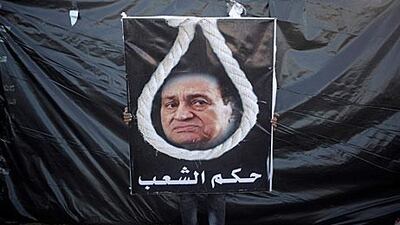CAIRO // If the defence lawyers in the Hosni Mubarak trial are to be believed, the ousted leader supported the uprising that toppled his regime.
His security chief gave orders to his top commanders not to use live ammunition to disperse the protesters, the lawyers have claimed, and the deaths of hundreds of protesters during the 18-day uprising were plots by the US and Israel and the work of agents from unidentified foreign powers.
The trial of Mr Mubarak has generated controversy since it started in August. Since then the proceedings against the former leader, his two sons and eight other defendants have descended into something akin to a farce.
The independent press and pro-reform activists have complained about the near reverence shown to the defendants by policemen and officials in the courthouse.
Lawyers for the victims have complained that the case presented by the state prosecution is weak.
The courtroom has often descended into chaos, with shouting and exchanges of insults among all parties - the judge, defence attorneys, lawyers for the victims, the policemen assigned to security in the courthouse and members of the media.
Judge Ahmed Rifaat has often argued with the lawyers for the victims, while the lawyers themselves engage in fierce arguments with one another over how to divide up the time allocated for their statements. They argue with the defence lawyers too, coming close to blows on repeated occasions.
"Execution, execution", shouted the lawyers for the victims when Mr Mubarak's chief defence attorney spoke of the ousted leader in glowing terms in a hearing last week. "Sit down and shut up," they shouted at a female supporter of Mr Mubarak who stood up in the middle of the argument to chant: "Mubarak, we love you."
Often despairing of the chaos in his courtroom, Judge Rifaat said: "This is an unbearably heavy burden and it's me, not any one of you, who will be held to account by the almighty."
Outside the court, supporters of Mr Mubarak and families of the victims have occasionally engaged in pitched battles, pelting each other with stones. On occasions, riot police have had to separate them.
In many ways, the "trial of the century", as it was dubbed at the start, has failed to live up to the hype that preceded it. Mr Mubarak, for example, has hardly said anything beside "Mawgoud", or present, when the judge calls out the defendants at the start of each session. The only time he spoke more was when he pleaded not guilty.
"I deny all these accusations completely," he said into a microphone, wagging his finger as he lay on the gurney brought from his suite at a military hospital east of Cairo.
Mr Mubarak's courtroom conduct is most likely dictated by his defence lawyer, the suave, cigar-smoking celebrity attorney Farid El Deeb. Mr El Deeb's list of clients includes Azam Azam, an Arab-Israeli convicted for spying for Israel but later pardoned. He also represented Talaat Mustafa, a real- estate tycoon sentenced to death for ordering the murder in Dubai of his ex-girlfriend, the Lebanese singer Suzan Tamim. The verdict was quashed on appeal and Mr Mustafa is now serving 15 years while awaiting a retrial.
Mr El Deeb has resorted to flowery Arabic and dramatic prose in his statements over five hearings.
Alluding to the former president's air force career as a pilot and commander, he said: "Mubarak, you are a hurt eagle in the sky." He told Mr Mubarak not to be sad "for you are no better than the Prophet", alluding to the persecution endured by the Prophet Mohammed in the early days of his message.
Mr El Deeb told the court that Mr Mubarak was still president since he had not signed any official documents stating his resignation and that the court was not qualified to try him. In a different part of his argument, he said Mr Mubarak continued to hold the rank of a major-general and only a military tribunal could try him.
The court policemen's concern with protecting the privacy of the defendants while in their courtroom cage has been a major source of tension with reporters keen to follow every move by Mr Mubarak and his co-defendants.
"Move out of the way," a female reporter shouted at a policeman during a recent hearing. "What are you doing there, guarding the metal fence?" she said.
Mr Mubarak, along with his former interior minister, Habib El Adly, and four top police generals, are charged with complicity in the killing of protesters. They could face the death penalty if convicted. Mr Mubarak, his two sons - the wealthy businessman Alaa and the one-time heir apparent Gamal - face separate corruption charges in the same case along with a family friend, the fugitive businessman Hussein Salem. Also on trial with them are two top police commanders charged with gross negligence.
The defence will present their case until February 16. No ruling is expected before late February.

